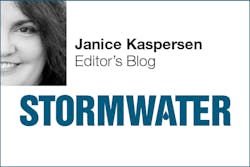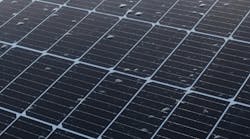
The upcoming November/December issue of Stormwater includes an article on how some stormwater programs are handling the problem of illicit discharges—ferreting out and stopping the release of things like motor oil, paint, concrete from construction sites, and so on into the storm sewer. The author asked several programs what their biggest problems are in terms of illicit discharges, and in some places, it turns out to be cooking oil, particularly the used oil and wash water from mobile food trucks. Many truck operators, having no convenient place to drain the stuff, simply “wash the kitchen out the back door and into the storm drain.”
Now—once some logistical problems are solved—there might be a market for that used cooking grease. As this article from the BBC explains, the global shipping industry is under fire for the heavy fuel it uses to power its ships, which results in releases of sulfur dioxide—a greenhouse gas and a contributor to acid rain. New international regulations go into effect in about year that will limit the sulfur dioxide content of shipping emissions from 3.5% to just 0.5% by 2020.
Shipping companies are trying to figure out their options. One is to use a lower-sulfur version of the fuels they’re currently using, which would be considerably more expensive. Another is to keep using the current fuels along with scrubber technology to remove sulfur dioxide from the exhaust. Installing scrubbers, however, can cost as much as $3 million per ship, and there is concern about how the ships will dispose of the sulfur-dioxide-laden discharge that results from the cleaning process; some older ships outfitted with scrubbers simply dumped it in the ocean.
Another option is biofuels. These include fuels made from food crops or algae, as well as diesel fuel made from cooking oil, known as hydrotreated vegetable oil, or HVO. The industry is concerned, though, about having a steady supply of biofuel if it makes the conversion. Using food crops might drive up the price of certain foods, and some within the industry don’t consider algae to be a very efficient or sustainable option. That means HVO, unlikely as it may seem, begins to look like a more attractive possibility.
Western Water Summit Call for Speakers Is Open
The Western Water Summit will take place January 22–23, 2019, in San Diego, CA. It focuses on all facets of water management: groundwater, surface water, wastewater, drinking water, irrigation, water law, reuse, generation, restoration, conservation and efficiency, and erosion and sedimentation. The Call for Speakers is open until November 1. Find more information about the conference tracks and registration at www.westernwatersummit.com.
About the Author
Janice Kaspersen
Janice Kaspersen is the former editor of Erosion Control and Stormwater magazines.

